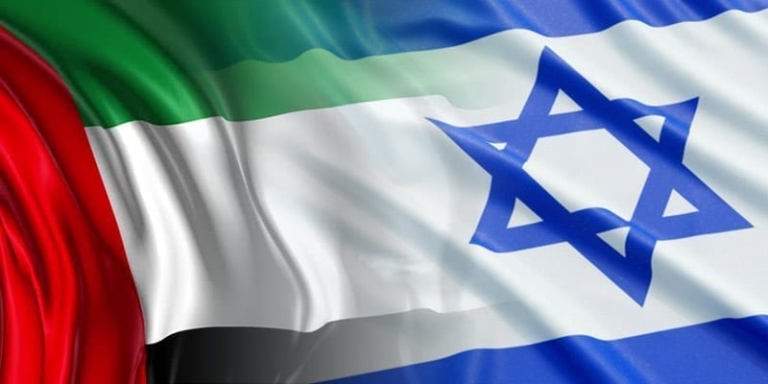
On August 13, a jubilant President Donald Trump announced from the White House a preliminary agreement between the United Arab Emirates and Israel on normalizing relations between the two countries. Trump, Abu Dhabi Crown Prince and UAE de facto ruler Mohammed bin Zayed (MbZ), and Israeli Prime Minister Benjamin Netanyahu all considered the agreement “historic.” The US president joked that he wanted to call the agreement the “Donald J. Trump Accord,” MbZ claimed that it “stopped” Israel’s annexation of occupied West Bank land, while Netanyahu basked in what he called “a historic evening.” Trump’s National Security Advisor Robert O’Brien quickly nominated the president for a Nobel Peace Prize.
Negotiations between teams from the UAE and Israel will meet in the next few weeks to hash out the process of establishing diplomatic relations, which would make the UAE the third Arab country to do so with Israel after Egypt (1979) and Jordan (1994). Pending such negotiations, the preliminary agreement contained an exchange of UAE normalization for a promise from Netanyahu to suspend the Israeli government’s declared plans to annex 30 percent of the occupied Palestinian West Bank, including the Jordan Valley. From all indications of past behavior by Netanyahu, this “suspension” promise is murky at best since he has reneged on many pledges previously, especially those related to Israel’s occupation of Palestinian land. At any rate, while celebrating the deal, Netanyahu insisted to the Israeli public this was only temporary and that he intends to go through with annexation.
To address different aspects of this announcement, Arab Center Washington DC (ACW) asked some of its fellows and other experts to provide their professional perspectives and analytical opinions. Their responses are below.
What are the implications of this accord for the Palestinian national movement?
Zaha Hassan, Visiting Fellow, Carnegie Endowment for International Peace
Palestinians are not celebrating the “Abraham Accord,” the agreement announced by Israel and the UAE about normalizing relations, now that the former has promised to postpone official annexation of large swathes of Palestinian land. Instead, UAE flags have been set ablaze in Hebron which, ironically, is the Palestinian city where Prophet Abraham is buried. According to the Palestinian leadership, the UAE’s decision to disregard the 2002 Arab Peace Initiative, which promised normalization of relations between Israel and Arab and Muslim states only after an end to Israeli occupation and resolution of the plight of Palestinian refugees consistent with international law, “is a betrayal of Jerusalem, the Al-Aqsa Mosque and the Palestinian cause” and de facto recognition of Jerusalem as the capital of Israel. Moreover, that is how most Arabs likely see this development despite the UAE’s attempt to paint itself as an Arab superhero that swooped in at the nick of time to save the Palestinian dream of a sovereign state.
To say that the Palestinian national movement is in crisis is a gross understatement. The UAE’s move to normalize relations with Israel is likely to be followed by other Gulf Arab states and possibly even some Muslim-majority countries in Africa. Hard conversations need to take place within the Palestine Liberation Organization (PLO) and between it and Palestinian constituencies, in the historic homeland and around the world, about what this moment means to the saliency of the political platform Palestinians adopted in 1988 for a state in Gaza and the West Bank with its capital in East Jerusalem. The Palestinian leadership in Ramallah has been putting this off for more than a decade. If the Abraham Accord is to be celebrated for anything, it will be for finally forcing the PLO/Palestinian Authority to stop looking externally for salvation and instead begin the difficult process of rebuilding Palestinian national institutions and moving toward a renewed liberation struggle that centers citizenship and equality over sovereignty.
What does the announcement mean for the Arab world?
Imad K. Harb, Director of Research and Analysis, ACW
The UAE becomes the third Arab country to establish diplomatic relations with Israel after Egypt and Jordan concluded peace deals in 1979 and 1994, respectively. In years past, such a development brought almost universal and quick denunciation from the Arab world; but considering the near collapse of the traditional Arab political order, Abu Dhabi is unlikely to meet with much criticism or condemnation. Besides, the UAE and other Gulf Arab countries have already had a number of contacts with the Zionist state that have barely registered any negative reaction from an Arab world beset with civil wars and security, political, and economic crises. Indeed, except for vocal denunciation from the Palestinian Authority, the Palestine Liberation Organization, Hamas, and other Palestinian parties and personalities, the UAE’s normalization with Israel is likely to sail unimpeded through the current thick and unmenacing Arab fog.
However, the UAE’s decision to break with the long-standing Arab boycott of Israel came at the expense of the collective official Arab position on peace with the Zionist state, represented in the 2002 Arab Peace Initiative. The API promised secure borders and normalized relations between the Arab world and Israel in exchange for its withdrawal from lands it occupied in the June 1967 war and acceptance of the establishment of an independent Palestinian state in the West Bank and Gaza with East Jerusalem as its capital. Since its launching, the initiative was ignored by Israel and barely endorsed by the United States, the self-appointed peace broker between the Arab countries and Israel. With the UAE agreeing to establish diplomatic relations with Israel with no regard for the original stipulations of the API, and with the Arab world’s rudderless efforts to support the Palestinian cause, it is not hard to assume that the initiative is as good as dead.
It is indeed doubtful that the UAE-Israel agreement or other potential openings with other Gulf and Arab countries will improve the Arab world’s position regarding support for an equitable resolution of the Palestinian dilemma. What is doubtless, however, is that Abu Dhabi’s move will soon be followed by similar ones; Bahrain and Oman, among the first to laud the agreement, are good candidates. The good relationship that MbZ has with Saudi Arabia’s Crown Prince Mohammed bin Salman may also prompt the latter to follow suit soon after ascending the throne. To be sure, it is hard to believe that MbZ would strike a deal with Netanyahu without first coordinating with Riyadh. Considering the poor state of affairs in the Arab world, the Arab boycott of Israel is practically over. Not that the Palestinians have relied much lately on a unified Arab position to defend their rights, but they finally can surmise that they truly are on their own.
A manufactured threat for the perfect PR stunt
Tamara Kharroub, Assistant Executive Director and Senior Fellow, ACW
US President Donald Trump hailed the agreement between the UAE and Israel as a “HUGE breakthrough” and “Historic Peace Agreement.” Media outlets in the United States, Israel, and the UAE followed suit, covering it as an important step forward, a major diplomatic achievement, and a geopolitical earthquake. But this so-called historic peace deal is neither historic nor a peace deal. The two countries have had relations and military intelligence cooperation since the 1990s, and rather than bringing peace, the deal hinders reaching an equitable peace by rewarding Israel for the occupation of Palestinian territory.
The purpose of this deal was certainly not peace, as none of the parties involved has shown any interest in it. Israel continues to plan to annex the West Bank and to violate Palestinian rights, the UAE is involved in military adventurism across the region and is even at war with its own citizens, and Trump is primarily concerned with transactional business arrangements while attacking peaceful protesters at home. The point of the deal is a PR boost for the three leaders and their political survival.
To be sure, the unveiling of the deal exposed the contradictory political campaigning strategies. Trump’s announcement called it “full normalization of relations,” while the UAE referenced a process toward normalization. On annexation, Trump said that “right now it is off the table” and is temporarily suspended. In contrast, MbZ tweeted in English and Arabic that the agreement would “stop further Israeli annexation of Palestinian territories.” That same day, Netanyahu noted in a press conference that there is no change in his plans and that annexation “remains on the table.” Each leader is clearly spinning the deal for his own political interest.
Here, a formal annexation declaration served as a manufactured threat to create international public panic. In reality, de facto annexation has already been happening for years, and de jure annexation had been stalled following opposition by a multitude of significant international players. But this panic opened a window of opportunity for Israel to shift the frame of the debate from a two-state solution to temporary suspension of formal annexation. Netanyahu has once again succeeded in being rewarded for keeping the status quo and for temporarily delaying formalizing a violation of international law that had already been unfolding, claiming it as a concession. Similarly, in usual Trump fashion, the president created a crisis—by encouraging annexation through his “Peace to Prosperity” plan—and is now taking credit for solving it, repackaging this deal as a foreign policy achievement.
The UAE also saw this panic as opportunity; it started the preparatory work through its ambassador in Washington, Yousef Al Otaiba, who wrote an op-ed in the Israeli newspaper Yedioth Ahronoth in June offering normalization in exchange for stopping annexation. MbZ is now spinning his country’s deal to Arab publics as the savior of Palestinians from annexation, while advancing his own authoritarian and military interests in the region and benefiting from Israeli weapons systems and surveillance technologies.
In essence, the agreement is a mere formalization of existing relations, and the media should call it what it is. This is not a peace deal but political campaigning at the expense of Palestinian rights and lives, and ultimately at the expense of peace.
What is at stake for the UAE with this development?
Kristian Coates Ulrichsen, Nonresident Senior Fellow, ACW
From a UAE perspective, an attraction of reaching a “Historic Peace Agreement” with Israel—as President Trump breathlessly declared on Twitter (no matter that the UAE and Israel have not been at war)—is that it aligns the UAE closely with the United States and Israel ahead of a highly contested US presidential election. It may be conjectured that the risk to the UAE is fairly low, given that if Trump loses in November, Prime Minister Netanyahu may be unlikely to proceed with his pledge to annex parts of the West Bank, knowing that an incoming Biden Administration would be strongly against such a move. In such a scenario, the UAE could—and already to some extent has started to—claim that its outreach to Israel and its offer to normalize relations has effectively taken annexation off the table and preserved the possibility, at least on paper, of a two-state solution.
That said, the UAE, and Abu Dhabi Crown Prince Mohammed bin Zayed in particular, are taking a calculated risk in assuming that Netanyahu will not feel pressured to annex parts of the West Bank if he faces a fourth election in November and if he feels that such a move would boost his chances of victory. If Trump loses his bid for reelection and Netanyahu is still in office during the US presidential transition, the Israeli prime minister may also feel the need to go for annexation while a lame duck president is in the White House and to establish “facts on the ground” for an incoming President Biden. Netanyahu has a precedent in his predecessor as prime minister, Ehud Olmert, who used the Bush-Obama transition in December 2008 to undertake Operation Cast Lead in Gaza.
There is therefore a degree of risk ahead for the Emirati leadership in that any Israeli decision on whether or not to annex is not within their capacity to control. Mohammed bin Zayed must therefore have believed that the short-term boost of such an announcement outweighs the medium-term uncertainty. Still, however, the rather different messaging put out by Emirati and Israeli (and US) officials as to exactly what was agreed in the trilateral call between Trump, Netanyahu, and MbZ may be a sign of things to come, if each party cherry-picks what it wants from the announcement and simply hopes for the best going forward.
Why now?
Yousef Munayyer, Nonresident Senior Fellow, ACW
Given that the Emirati-Israeli relationship was the second worst kept secret in the Middle East, after Israel’s nuclear weapons program, the formalization of the two countries’ relationship could theoretically have happened at some point in the past or some point in the future. This begs the important question, what explains the timing of the agreement now?
The background of this spectacle involves key Israeli, Emirati, and American personalities who have developed a close relationship since the start of the Trump Administration and taken several steps––from Trump’s visit to Saudi Arabia in May 2017 to the Manama Conference on Gulf security in 2019 to this UAE-Israel deal––to create a “new Middle East.” Thus it is unsurprising that this latest drama comes as Donald Trump is less than three months from facing an election, one that could bring an end to his presidency.
Indeed, given the use of “stopping annexation” as a fig leaf to cover the UAE’s shame of betraying the Palestinian cause, one must wonder just how long this plan was in the works. Netanyahu insisted on being able to advance annexation legislation as early as last July 1st—an expected announcement that never materialized. About a week after that, the Emirati ambassador to the United States Yousef al-Otaiba published a Hebrew language editorial in the Israeli Yedioth Ahronoth, imploring Israel not to risk normalization because of annexation. A month later, as everyone was still trying to understand why the annexation proclamation never came, a normalization announcement came instead.
Considering all of this, the normalization declaration seems like a thoroughly choreographed program intended to have some impact in American and Israeli domestic politics. For Trump, the Middle East has consistently been a place which he has hoped to use to solidify his support among white Evangelicals, a constituency he absolutely needs to be competitive in the November election but among whom polls recently showed a slippage in his support. For Netanyahu this will serve as another campaign promotional tool to go alongside the many gifts he was able to extract from Washington. For the Emiratis, however, the payoff is far less clear. Perhaps, given how heavily invested they have been in Trump, they calculated that a last-ditch effort to try to save him was worth the regional costs of such a decision. If they had hoped to hedge their bets for a Biden Administration, one might imagine them holding this off until after the election, at least. Overall, in trying to understand the timing of this UAE-Israel-US announcement, November 3rd looms largest in the picture.





